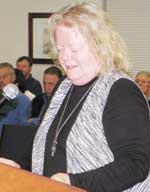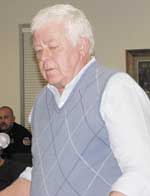BY LINDA BENTLEY | DECEMBER 21, 2011
Council votes to let people decide on property tax
‘If people want a property tax, let them put an initiative on the ballot’
CAVE CREEK – Some folks may remember back in 2003 when council first discussed looking at other options for fire protection, including the institution of a property tax and/or annexing into the Daisy Mountain Fire District, as proposed by Councilwoman Shea Stanfield.
Stanfield exclaimed, “Let the people decide.”
It never got that far, since the rest of council was dead-set against asking citizens to impose a property tax when they could voluntarily subscribe to Rural/Metro Fire.
Had citizens followed Stanfield’s lead and annexed into the Daisy Mountain Fire District, they would now be paying $2.97 per $100 in full cash valuation on their property tax bill for fire protection.
Today, that would add approximately $1,040 to the tax bill of a home valued at $350,000 and would fluctuate based on the whim of the county tax assessor.
Rural/Metro bases its rates on square footage of structures. Rural/Metro, even as a property tax, would be $304.50 for the same home, less than one third the cost of Daisy Mountain.
When the same issue was presented to council in January, before Thomas McGuire and Shelley Anderson were elected to council, it was voted down by a vote of 4-3, with Mayor Vincent Francia and councilmen Steve LaMar and Jim Bruce voting in favor of letting voters decide if they wanted to impose a property tax on themselves for fire protection.
The vote on Monday was 4-3, this time in favor of bringing a property tax to the voters. However, this time, Francia, who said he was conflicted over the issue, joined Vice Mayor Ernie Bunch and Councilman Dick Esser in dissenting.
During Call to the Public, former Councilman Adam Trenk addressed both the proposed property tax and the subsequent agenda item, which would earmark .5 percent of the town’s sales tax revenue to subsidize the property tax of $1.3 million by approximately $500,000.
He said, “If people want a property tax, let them put an initiative on the ballot.”
Trenk, who voted against the property tax being put to a vote in January, went on to say the .5 percent increase in sales tax in 2009 was supposed to be temporary and said council should repeal that .5 percent and give it back.
He stated Cave Creek had one of the highest sales tax rates in the state and if the town was so flush with cash, “Let’s not look for new ways to spend it.”
Mike Rigney, at the behest of Town Manager Usama Abujbarah, put together a PowerPoint presentation that showed examples of what property taxes would be versus a Rural/Metro subscription.
However, the only examples of vacant land included in the mix were parcels of five acres or less adjacent to homes under the same ownership for which Rural/Metro does not charge and additional fee.
Rigney’s presentation did not include any of the large vacant parcels in Cave Creek for which Rural/Metro charges a nominal fee of $77 per acre and a nominal amount for each additional acre or, let’s say approximately $100 per year for a large parcel.
Going to a tax-based system would mean owners of vacant land valued at $1.2 million would see a property tax increase of $1,670.
Rigney stated the majority of fire subscribers will see substantial savings.
What he didn’t say is that a substantial portion of those savings would be at the expense of approximately 1,284 vacant land owners, who most likely live elsewhere or may be corporate entities and are unable to vote.
During public comment, Paul Eelkema said he was in favor of putting this on the ballot but the issue was how it is communicated to the public. He said the town needed to “craft the language so it’s clear.”
 Carol Perry (r) said citizens formed a PAC 11 years ago to promote a tax to preserve Spur Cross but when Francia spoke about the benefits of Home Depot coming to Cave Creek when it was first proposed, she said it was a “few bullies” who “shouted out the voice of reason.”
Carol Perry (r) said citizens formed a PAC 11 years ago to promote a tax to preserve Spur Cross but when Francia spoke about the benefits of Home Depot coming to Cave Creek when it was first proposed, she said it was a “few bullies” who “shouted out the voice of reason.”
She expressed support in bringing the issue to voters.
 Harold’s partner Bill Vale (l), whose Rural/Metro subscription is a little over $4,100, and would save approximately $1,500 on a tax-based system, said he was confused.
Harold’s partner Bill Vale (l), whose Rural/Metro subscription is a little over $4,100, and would save approximately $1,500 on a tax-based system, said he was confused.
“I was adamantly opposed to raising water rates. I was told it was temporary,” said Vale. “You raised sales tax. I was told it was temporary.”
Vale stated, “This whole thing is smacking of Pelosi and Reid,” adding, “Harold’s is paying $4,100 … and I’m glad to pay it because I don’t want any more mandates.”
Charles Spitzer, a Rural/Metro subscriber, said, “This isn’t about fairness. A vocal minority wants more people to pay so they can pay less,” and stated, “Only about one third of property owners deduct property taxes.”
Spitzer said, “It’s been said voters should make the decision. The majority doesn’t want this. The minority wants someone else to pay.”
David Smith, an advocate of paying for fire service through property tax, said, “Some people think paying for fire protection is a personal decision like health insurance. Someone has to pay.”
Sonoran News Publisher/
Editor Don Sorchych told council, “There is nothing more evil than property tax,” and asked why the town was being so hasty.
He said, “I agree with everything Adam Trenk said for the first time in history and I agree with everything Bill Vale said. The wisest thing is to turn this down and give it a few more years.”
Bruce moved to approve sending the property tax measure to voters and said nothing has happened since 2008 when the committee reached the same conclusions and stated, “The only way to get the ball rolling is let citizens decide. I’m for it as a citizen and town council member.”
LaMar, who seconded the motion, said he supported it last time around as well.
He said, “The only way to have a sustainable system is to have a system of paying for it. The current system is not sustainable for the long term.”
Councilman Thomas McGuire stated it was not a question of ideology to him but a question of the town’s needs.
He said it should be put to a vote and let the citizens decide.
Esser commented, “This is a tax forever. It does not sunset. As a former bureaucrat, I’ve never seen one go away. If 47 percent of the people don’t subscribe, maybe some can’t afford it.”
He said, “Once again, this is a knee-jerk reaction and this is being shoved down our throat.”
Bunch said he was annoyed at those who don’t subscribe and whom he is forced to subsidize, but noted there were people who own property who don’t have a vote.
Francia, said he voted for this last time but was conflicted this time around – conflicted about citizens having the right to vote and what he’s sending to citizens.
“It is a property tax,” said Francia. “I’m in conflict with friends and council members.”
He said, “The tax goes on and on and on. Just like the 1/2 cent sales tax to subsidize a property tax. We are not flush and to take 1/2 cent sales tax from the general fund … I am not able to support this at this time. I am conflicted.”
When it came to the next item to subsidize the property tax with the 1/2 cent sales tax, council members realized that decision could be changed at any time by a vote of council.
LaMar said council should keep the property tax vote clean without a promise of subsidizing it with sales tax.
Council agreed and voted unanimously against the sales tax subsidy.





